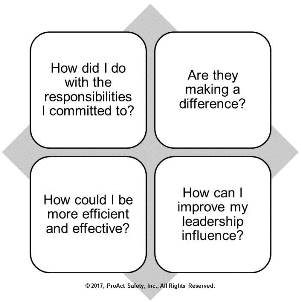To Be a Better Leader, Ask These Four Questions Daily
There will always be new opportunities for greater efficiency and new results. If you are indeed doing the right things, how could you be better at it?
What are you doing to improve your leadership abilities to be a greater influence on others in your organization? What questions shape how you reflect on your work at the end of the day?
Leaders not only set the priorities and direction of the organization, but also influence beliefs, decisions, behaviors, and stories. Actor turned director Clint Eastwood once warned, "It takes tremendous discipline to control the influence, the power you have over other people's lives." Have you ever experienced a leader who said one thing and did another, or who offered a comment that sent the organization in an unintended direction, or one who didn’t speak up, reinforcing the wrong priorities or behaviors? With leadership comes great responsibility.
What questions shape how you reflect on your day during your trip home? Great leaders are purposeful about this and are mindful that what they do affects the behaviors of others. Toward the end of our popular Leadership Safety Coaching Workshops, four questions are encouraged to be asked and answered as each workday comes to an end. Asking these questions will make you a better leader.

How did I do with the responsibilities I committed to? Dr. W. Edwards Deming, the father of quality evolution, reminded us, "It is not enough to do your best; you must know what to do, and then do your best." Most companies can only execute well on a few strategic priorities each year. During strategy development and goal deployment projects, it is critical that the most important roles and responsibilities are aligned with the most important priorities. While being efficient is doing things right, being effective is doing the right things. To answer this first question, you must decide what your most important responsibilities are to not only improve the business areas of performance (e.g., quality, productivity, customer service, safety) but also the culture that will sustain these efforts. List for yourself two or three responsibilities which, if you committed to them, would make the biggest difference. To increase accountability, consider communicating these to others: your peers, the individual to whom you report, and even the individuals you lead. Then, are you doing what you said you would do?
Are they making a difference? If the priorities, goals and outcomes are clear, are they getting you closer to your desired state? In our work at ProAct Safety, we help leaders create a visual representation of what success would look like and align improvement efforts toward it. It is not enough to get great results as a leader, you must also know precisely why and how the results were achieved or not. Success should be defined in both results and indicators (behaviors are a common example) that show progress toward it. The authors of the 2011 book "Progress Principle" pointed out that progress toward a goal is one of the most effective motivators at work. Are the responsibilities you have committed to demonstrating progress to you and others? The answer to this helps you either stay the course or quickly change direction.
How could I be more efficient and effective? Two questions have been helpful to me and shape how I personally work to improve results: Am I as efficient as I could be? Am I capturing and delivering value to the customers of my effort? Regardless of the industry, how success is defined evolves significantly at least every decade. There will always be new opportunities for greater efficiency and new results. If you are indeed doing the right things, how could you be better at it?
How can I improve my leadership influence? The essence of leadership is influence that manifests itself in the visible actions of others in the leader's absence. How will you leverage your position in the organization to have a more positive effect on performance and results? How can you deliver more value? How can you help those you are leading be more successful tomorrow than they were today? What can you do to facilitate? What barriers can you remove? How can you provide more positive reinforcement?
Improving performance within an organization begins with improving those leading it. As flight attendants recommend, "Put your oxygen mask on first before helping others." Real leadership accountability begins with the leader. These simple yet powerful questions, if asked and answered each day, will make you a better leader; and, in turn, help those you are leading become better performers, as well.
This article originally appeared in the July 2017 issue of Occupational Health & Safety.